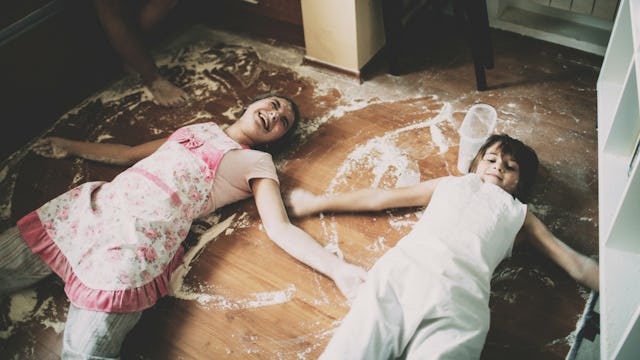How The Wabi Sabi Approach To Parenting Helped Me Embrace The Messiness Of It

I sit on the sofa in my living room, staring at the seemingly never-ending state of dishevelment that surrounds me. The throw pillows tossed on the floor. The coffee table pushed over to make room for a game that requires rug space. A few random Lego pieces, long lost from whatever set they came from, awaiting for some poor, barefooted soul to step on them.
My home is far from perfect. I occasionally get it close—usually with a fair amount of sweating and yelling at my family—but even close-to-perfect never lasts long. And I can easily let that bother me. I’m a fan of HGTV and Better Homes & Gardens. I appreciate a show-ready home, and deep down I’d really love to live in a “Fixer Upper” reveal.
But that’s not what my life looks like. The reality of my life—the busy, beautiful life I’ve purposefully built—is messy.
And that’s perfectly okay. The Japanese have a traditional concept called wabi sabi, which has helped me embrace the imperfection of my home, my parenting, and my life in general. Wabi sabi is an ancient philosophy that is difficult to translate precisely, but the basic idea is that there is beauty to be found in the imperfection, incompleteness, and impermanence of things.
With three kids, a spouse, a career, a community, and my own needs to attend to, everything is always in flux in some way. With so many constantly moving parts, how could I ever expect anything in my life to be perfect for any length of time?
And yet, it’s so easy to fall into the perfectionism trap, especially when it comes to parenting. I started out my parenting journey with so many ideals and standards for myself as a mom, and I’d beat myself up when I fell short. Raising our kids is something we really don’t want to screw up on, so it’s natural to want to do everything just right.
But perfection is not only unattainable, I’ve come to believe it’s not even desirable. Humans are not perfect. We are always changing, always striving, always making mistakes, and always picking ourselves up after we slip and fall. And that is part of the beauty of being human. Not only that, it’s part of the beauty of raising kids.
Humans teaching, nurturing, and caring for other humans is about the most imperfectly beautiful thing there is. And because kids are growing and changing so fast, nothing stays the same throughout that process. As parents, we live in a constant state of impermanence, incompleteness, and imperfection with our children. And if we don’t embrace that ever-changing state and appreciate the wonder and beauty of it, we miss out on a lot of the joy in the process.
There is simply no room for perfectionism in parenting. And the concept of wabi sabi can help us not only accept the messy reality of life with kids, but truly celebrate it. Like the beauty of the seasons, of flowers, of sandy beaches and eroded rock formations, the ever-changing nature of parenting doesn’t require perfection or completeness in order to touch our souls, bring a tear to our eye, or take our breath away.
Parenting is a beautiful experience not in spite of its inherent imperfections, but because of them. When we recognize that, it’s easier to be patient, to lighten up, to be mindful in the moment, and to let things like misplaced throw pillows go.
We don’t have our kids with us forever. The age and stage they are in today will pass before we have time to blink, replaced with another age and stage, and another, and another. Even if we were to attain some magical parenting ideal for a moment, it wouldn’t last. It couldn’t. That’s why the wabi sabi approach to parenting makes perfect sense. Since our family life will always be delightfully disheveled and perfectly imperfect, we may as well find the beauty in that and celebrate it.
This article was originally published on